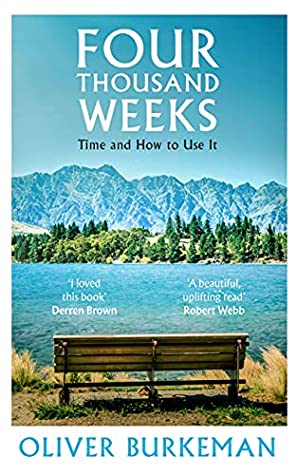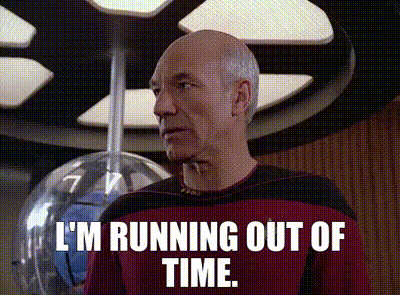 Oliver Burkeman’s Four Thousand Weeks is a title that I’ve already referenced several times in my posts, as it’s caused a transformative shift in my thinking during the past couple of months. Its central premise - that even if we’re fortunate to live til we’re 80, that only amounts to 4,000 weeks on the planet - initially seems to be nihilistic or demotivating, but the book delivers powerful messages about focusing on the right things, and learning to disregard those that are out of your control.
Oliver Burkeman’s Four Thousand Weeks is a title that I’ve already referenced several times in my posts, as it’s caused a transformative shift in my thinking during the past couple of months. Its central premise - that even if we’re fortunate to live til we’re 80, that only amounts to 4,000 weeks on the planet - initially seems to be nihilistic or demotivating, but the book delivers powerful messages about focusing on the right things, and learning to disregard those that are out of your control.
You’ll never do everything
So many prominent authors choose to focus their efforts on helping us to become more efficient, more productive, able to “get more done”, ostensibly so that we can move closer to conquering all that life has to offer us. We’ve even embraced the term “life hack”, as if our very existence is something that we have to find ways to cheat. Capitalism wants to work against us in our efforts: we work longer and harder, to earn more money, to do activities that we no longer have time to do.
The more we fight against this, the more we hit upon what Oliver describes as the “paradox of limitation” - it’s only when we actively try to master our time that we discover how inherently impossible it is, which leaves us stressed and frustrated. Or, in our efforts to “do more”, we (and especially me!) create lists of tasks, and then focus on clearing as many of those tasks as possible, regardless of whether they are the most important tasks to be done in that moment.
Life’s too short
We’ve all had “near misses” in our lives; those moments, however small, which make us confront our own mortality. The author reflects on a mass shooting at a Canadian venue where he’d been just a few days before. For me, it was the 7/7 terror attacks in London (I was supposed to take the tube to Kings Cross during morning rush hour, but a screw-up with a hire car had delayed me by a couple of hours). However tangential, such events give us pause to reflect on our mortality. They say “live every day like it’s your last” - but one day, it might actually be.
Burkeman references the works of renowned German philosopher Martin Heidegger, who wants us to be more comfortable with our finitude: everything we choose to do with our time is implicitly a sacrifice of doing something else with that time. Rather than being paralysed by this, we should treat this as a commitment to making the most of what we do choose to do.
“It’s a positive commitment to spend a given portion of time doing this instead of that - actually, instead of an infinite number of other “that”s - because this, you’ve decided, is what counts the most right now. In other words, it’s precisely the fact that I could have chosen a different and perhaps equally valuable way to spend this afternoon that bestows meaning on the choice I did make. And the same applies, of course, to an entire lifetime […] It is the thrilling recognition that you wouldn’t even really want to be able to do everything, since if you didn’t have to decide what to miss out on, your choices couldn’t truly mean anything.”
The alternative, then, is to live for the present. If you’re an obsessive planner (again, like me!) then you’ll have doubtlessly encountered stressful moments when the plan somehow goes awry. Meanwhile, the person next to you who’s on the same journey isn’t as worried, because they’re not trying to follow a tightly prescribed schedule. We’re also prone to treating our careers in the same way; similarly to how it’s discussed in The Happiness Advantage, we fall into a “when-I-finally” trap: we find ourselves striving for some idealised future state, which might be impossible to reach, and disheartening if we don’t get there.
Do what matters
As somebody who lives by their plans and to-do lists, this was all beginning to sound alarming, but fortunately Burkeman proposes some simple fixes. There’s long been the concept in personal finance of “pay yourself first”: that is, you can save money more effectively if you put it aside on payday, rather than waiting until the end of your pay cycle to see if any money is left over (because it rarely will be). We should try to do the same with our time: rather than assuming we’re going to work hard enough to reach a state where we have “free time” (a state which is perilously difficult to reach in the working world), we should allow ourselves to do the activities that matter most to us (maybe by blocking some hours out of our calendar, or committing to taking a day off) and to “accept the consequences”.
This is similar to the 2017 Harvard Business School research which discovered that people are happiest when they use their money to “buy time” - for instance, by paying somebody to perform time-consuming tasks or chores, thereby creating more opportunity to do activities that they care about. (Or, alternatively, by choosing to earn less in order to spend less time working in the first place.)
While we’re not all privileged enough to be so selective with where our money goes, if we’re willing to accept the uncomfortable truth about the brevity of our existence, we can more easily confront some of the distractions which are currently sapping our attention. Technology (particularly the internet and mobile phones) are a major drain here: not just in our usage of them, but in the way that they dominate our thought:
“My newborn son would do something adorable, and I’d catch myself speculating about how I might describe it in a tweet, as if what mattered wasn’t the experience but my (unpaid!) role as a provider of content for Twitter.”
While Burkeman acknowledges the important role of technology in our working lives, he suggests one interesting tweak; we should try to make our technology more “boring” (for instance, by using the accessibility features on our phone to set the screen to grayscale, making the device feel more like a tool) or by selecting “devices with only one purpose”; for instance, reading digital books on a Kindle, rather than on the Kindle app on our phones, because you won’t have the distraction of a hundred other apps while you’re trying to read.
Key takeaways 📝
- We only have a short, precious amount of time in our lives - use this realisation to create focus and purpose.
- Don’t be paralysed by choice - instead, celebrate the choices that you have made.
- Do what’s necessary to create time for yourself now - because later may never come.

